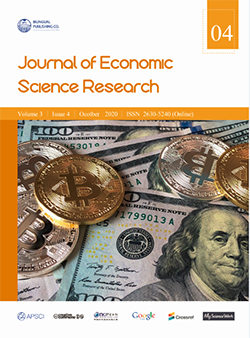Economic Policy Uncertainty and Corporate Mergers and Acquisitions
DOI:
https://doi.org/10.30564/jesr.v3i4.2413Abstract
In recent years, the frequent adjustment of the government’s economic policies and the uncertainty of foreign economic situations have made the degree of uncertainty of China’s economic policies rise continuously. The increasing degree of policy uncertainty will inevitably affect the investment and financing decisions of micro enterprises. Then, how does economic policy uncertainty (EPU) affect mergers and acquisitions (M&A) behavior? What’s the mechanism? Based on the above questions, this paper uses the data of non-financial listed companies in the Shanghai and Shenzhen stock exchanges from 2008 to 2018 as a sample to explore the relationship between EPU and M&A. The study shows that rising EPU will promote corporate M&A behavior, and this effect is more significant in slow-growth companies. The relationship between EPU and M&A is affected by corporate governance, stock price volatility and financing constraints. Specifically, the company’s M&A size is more sensitive to EPU with higher level of corporate governance, higher level of stock price volatility, and lesser financing constraints. Further research shows that the rise of EPU will significantly promote the improvement of M&A performance in the short-term, but this effect does not exist in the long-term. Various robustness checks do not change the empirical results of this paper.
Keywords:
Economic Policy Uncertainly, Corporate merger and acquisition, Financing constraints, M & A performanceReferences
[1] Gulen, H., M. Ion. Policy Uncertainty and Corporate Investment[J]. The Review of Financial Studies, 2016, 29(3): 523-564.
[2] Wang, H., Q, Li, F, Xing, Economic Policy Uncertainty, Cash Holdings and its Market Value[J]. Journal of Financial Research, 2014(9): 53-68. [3] Peng, Y., X, Han, J, Li. Economic Policy Uncertainty and Enterprise Financialization[J]. Chinese Industrial Economy, 2018(1): 137-155.
[3] Julio, B., and Y. Yook. Political Uncertainty and Corporate Investment Cycles[J]. The Journal of Finance, 2012, 67(1): 45-83.
[4] Chen, S., Zhan, Li. Economic Policy Uncertainty and Analysts’ Earnings Forecast Correction [J].World Economy, 2017(7):169-192
[5] Baker, S., N. Bloom, S. Davis. Measuring Economic Policy Uncertainty[J]. Quarterly Journal of Economics, 2016, 131(4): 1593-1636. [7] Zhang, W, A, Qi, A Review of Theoretical Research on Merger[J]. Nankai Management Review, 2002(2): 21-26.
[6] Zhou., X, S, Li. Research on the Influencing Factors of M&A Value Creation[J]. Management World, 2008(5): 134-143.
[7] Tan, X, W, Zhang. Analysis on the Channels of Enterprise Investment Influenced by Economic Policy Uncertainty[J]. World Economy, 2017(12): 3-26.
[8] Wang, Y. Z., C. R. Chen, and Y. S. Huang. Economic Policy Uncertainty and Corporate Investment. Evidence from China [J]. Pacific-Basin Finance Journal, 2014, 26(1): 227-243.
[9] Liu, Z., C, Wang, T, Peng, Policy Uncertainty and Corporate Risk-taking: Opportunity Expectation Effect or Loss Avoidance Effect[J]. Nankai Management Review, 2017(6): 15-27
[10] Li, Feng., Feng, Li, Z, Yang. Will Economic Policy Uncertainty inhibit Corporate Investment? An Empirical Study based on China’s Economic Policy Uncertainty Index[J]. Journal of Financial Research, 2015(4): 115-129.
[11] Shen, H, P, Yu, L, Wu, State-owned Equity, Environmental Uncertainty and Investment Efficiency[J]. Economic Research, 2012(7): 113-126.
[12] Zhang., X, Does M&A and Reorganization Create Value?-An Theoretical and Empirical Research on China’s Securities Market[J]. Journal of Economic Resarch, 2003(6): 20-29
[13] Bagnoli, M., B. Lipman. Successful Takeovers without Exclusion[J]. Review of Financial Studies, 1988, 1(1): 89-110.
[14] Zhao., Xi, X, Zhang. Internal Control, Executive Power and M&A Performance: Empirical Evidence from China’s Securities Market[J]. Nankai Management Review, 2013(2): 75-81.
[15] Durnev, A., R. Morck, Y. P. Zarowin. Does Greater Firm-Specific Return Variation Mean More or Less Informed Stock Pricing?[J]. Journal of Accounting Research, 2003, 41(5): 797-836.
[16] Pastor, L., P. Veronesi. Political uncertainty and Risk Premier[J]. Journal of Financial Economics, 2013, 110(3): 520-545.
[17] Wang, Y, M, Song, Macroeconomic Uncertainty, Capital Needs and Company Investment[J]. Journal of Economic Research, 2014(2): 4-17.
[18] Allen, F., J. Qian, M. Qian. Law Finance and Economic Growth in China [J]. Journal of Financial Economics, 2005, 77(1):116-157.
[19] Kaplan, S., L. Zingales. Do Investment-Cash Flow Sensitivities Provide Useful Measures of Financing Constraints?[J]. Quarterly Journal of Economics, 1997, 112(1): 169-215.
[20] Zhou., S, H, Wen. Research on M&A Performance Evaluation System Based on Industry Evolution and M&A Motivation[J]. Accounting Research, 2013(10): 75-82
[21] Bruner, R. F. Does M&A Pay? A Survey of Evidence for the Decision-Maker[J]. Journal of Applied Finance, 2002, 12(1): 48-68.
[22] Bhaumik, S.K., E. Selarka. Does Ownership Does ownership concentration improve M&A outcomes in emerging markets?: Evidence from India[J]. Journal of Corporate Finance, 2012, 18(4): 77-726.
Downloads
Issue
Article Type
License
Copyright and Licensing
The authors shall retain the copyright of their work but allow the Publisher to publish, copy, distribute, and convey the work.
Journal of Economic Science Research publishes accepted manuscripts under Creative Commons Attribution-NonCommercial 4.0 International License (CC BY-NC 4.0). Authors who submit their papers for publication by Journal of Economic Science Research agree to have the CC BY-NC 4.0 license applied to their work, and that anyone is allowed to reuse the article or part of it free of charge for non-commercial use. As long as you follow the license terms and original source is properly cited, anyone may copy, redistribute the material in any medium or format, remix, transform, and build upon the material.
License Policy for Reuse of Third-Party Materials
If a manuscript submitted to the journal contains the materials which are held in copyright by a third-party, authors are responsible for obtaining permissions from the copyright holder to reuse or republish any previously published figures, illustrations, charts, tables, photographs, and text excerpts, etc. When submitting a manuscript, official written proof of permission must be provided and clearly stated in the cover letter.
The editorial office of the journal has the right to reject/retract articles that reuse third-party materials without permission.
Journal Policies on Data Sharing
We encourage authors to share articles published in our journal to other data platforms, but only if it is noted that it has been published in this journal.




 Xun Han
Xun Han

